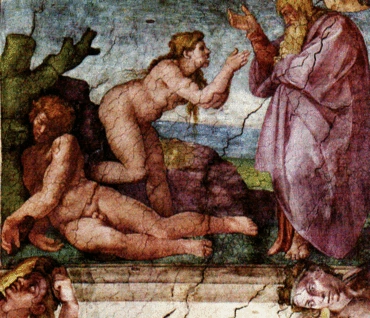Explanation of Genesis 2:24
От Brian David

This verse uses "man" in a masculine sense, meaning thoughts and ideas in the intellect. Leaving father and mother means leaving the former state of internal spiritual awareness, and cleaving to his wife means being conjoined instead with the external awareness of life. Being one flesh means that the internal of the man and the external of the wife were together as one in life.
The people of the Most Ancient Church wanted to live from themselves. So the Lord created in them the capacity to feel that, though it meant they had to descend from the spiritual awareness they had enjoyed. But they weren't bad people; they still loved the Lord and wished to be good. They just wanted to feel that they were doing it themselves. By having the man cleave to the wife, the Lord allowed the people's higher internal states to enter into their external lives and be part of that sense of self, so they could indeed love the Lord as if from themselves.
(Препратки: Arcana Coelestia 160, 161, 162)
Dust
Dust, in Ezekiel 26:12, signifies the lowest things which are of the sensual principle of man. They can be either good or bad, depending on the context.
In Isaiah 40:12, the dust signifies exterior or natural truths and goods of heaven and the church.
In Genesis 2:7, the dust is good, and we see some interesting nuances:
First, there's this: 'To form the man, dust from the ground' is to form his external man, which had not previously been man... (Arcana Coelestia 94)
Here, this formation of our external body and mind is a precursor, setting the stage for God to "breathe into our nostrils".
In Arcana Coelestia 1610, we find this passage, where again, dust has a good signification:
'Dust of the earth' has regard to those things that are celestial, for, as shown already, 'the earth' means the celestial aspect of love; 'dust of the sea' has regard to those things that are spiritual, for 'the sea', as has also been shown, means the spiritual aspect of love; while 'as the stars of heaven' means both but in a higher degree. And because these things cannot be numbered they therefore became common expressions to describe growth and multiplication beyond measure.
Then, in Arcana Coelestia 3707, these ideas get pulled together:
The reason the dust of the earth symbolizes goodness is that the earth, [or land,] symbolizes the Lord’s kingdom and therefore goodness, as shown just above in §3705. The dust of that land, then, means goodness, but earthly goodness, since the land symbolizes what is lowest in the Lord’s kingdom....
But there are bad connotations, too. In Micah 7:14-17, licking dust symbolizes being only sensual - bodily and external, worldly, and selfish. It's much the same in Psalms 72:9, where "Barbarians will bow down before God, and His enemies lick the dust...". See Arcana Coelestia 249, 3413 for interesting explanations of this.
(Препратки: Apocalypse Explained 1145)






